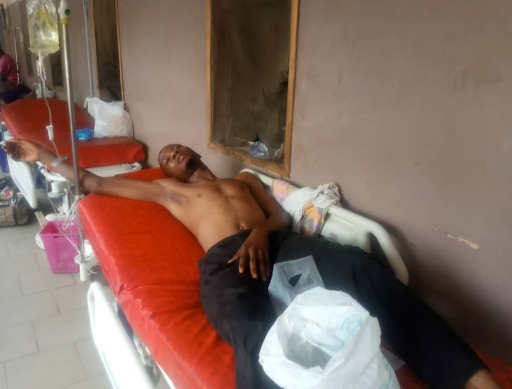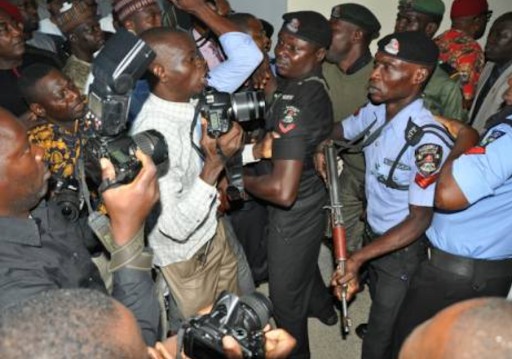
The magnitude of attacks suffered by Nigerian journalists intensifies yearly. From harassment to torture to unlawful arrest, physical assault, and a threat to life. These do not only affect their work but also violate their fundamental human rights.
While the governments have shown their proclivity for dictatorial actions, individuals not pleased with credible journalism also attack journalists for simply doing their work.
Aside from being ranked 120 of the 180 countries where journalism is difficult to practice in the world by Reporters Without Borders (RSF) in the 2021 World Press Freedom Index, Nigeria falls under countries with “dramatic deterioration in people’s access to information and an increase in obstacles to news coverage.”

The country is on the same level with countries such as Afghanistan, Jordan, Zimbabwe, Palestine, and Qatar who are described as having ‘problematic’ environments for press freedom.
On April 16, 2021, five hoodlums beat to a stupor Frederick Odimayo, editor with the privately-owned Grace FM in Lokoja, Kogi State, North-central Nigeria, over his report of their heinous activities.
He was at a mechanic shop at around noon when the thugs approached him and accused him of destroying their drug-trafficking business with the report published a month earlier.
“I collapsed and found myself in a coma at Federal Medical Centre. I would have died if not for doctors who swiftly attended to me. I spent three days in the hospital bed before I was discharged,” Odimayo narrated.

Days after he was discharged from hospital, Odimayo noticed that he could barely walk. He sent for his parents who took him to his hometown in Ondo, Southwest Nigeria, for “spiritual revival.”
“My wife and two kids were left to suffer in Lokoja when I was away. She was traumatised as well as my parents. In all, I endured pains from the beating for a month,” he added.
Asked if the predicament discouraged him from best journalism practice, Odimayo said his passion for Nigeria is real and won’t be discouraged.
Narrating his ordeal to HumAngle, Eniola Daniels who works as crime/metro reporter with the Guardian Newspaper said he was assaulted by the Police on March 1, 2021.
He got a call that the Police attached to Lagos Task Force were burning tyres and destroying shops at the shanties on Oshodi-Apapa Expressway in Lagos.

He arrived at the scene early enough to capture the burning of the shanties. Minutes after he started taking pictures for his report, a plainclothes police officer slapped him from behind and other security men dragged him into a Black Maria. Despite identifying himself with his press card, he was beaten. His phone was seized and smashed.
After being kept in the vehicle for 10 minutes, he was released and his smashed phone was returned with the Police instructing him to delete all shots taken.
“Till now, I still get bullied by the police officers anytime I come across them on duty,” he said bitterly.
His encounter was similar to that of Sikiru Obarayese, Osun State Correspondent of DailyPost Newspaper. He was covering the one year anniversary of the #EndSARS protests on Oct. 20, 2021, when he was attacked.

His ‘crime’ was taking pictures of officers clamping down on peaceful protesters. The journalist was brutalised, detained, forced to write a statement, and arraigned in court within an hour. Obarayese was accused of breaching peace, saying his offence was contrary to Sections 249(5) and 356 of the Criminal Code Cap 34. Laws of Osun State.
Interestingly, the Magistrate, A.O. Daramola, queried the prosecutor on what prevents a journalist from taking photographs. He ordered that the matter be struck out and discharged the journalist.
Illegal detention, assault
Aside from those brutalised, many Nigerian journalists have in the past been detained illegally for months. Sadly, this has been the trend since the military era.
Journalists like Ray Ekpu, Babafemi Ojudu, Dapo Olorunyomi, Chris Anyanwu, Ben Charles-Obi, George M’bah, Onome Osifo-Whiskey and many were detained illegally and even forced into exile during military regimes.
In fact, security operatives in Feb. 1997 went as far as ‘kidnapping’ Razor publisher, Moshood Fayemiwo in broad daylight in neighbouring Benin republic and brought him to Nigeria. The journalist was detained, chained to a pipe, and tortured until his release in September.
In an article published on TheNEWS shortly after his release, Kunle Ajibade said “my happiest day in prison was when they brought my second son to me. My wife was carrying his pregnancy when I was arrested. He was born Jan. 16, 1996, and he was brought to Makurdi Prisons in April 1996. I had sent his name, Folarinwa, from prison. He was four months old when I saw him for the first time. My incarceration caused my wife a lot of problems. That she delivered safely was a great relief.”
Though some of these journalists got accolades for their roles in the pro-democracy struggle and efforts to get rid of the military, journalists still face hardship in the current democracy.
For instance, Jones Abiri, editor and publisher of The Weekly Source in Bayelsa, South-south Nigeria, was arrested in July 2016. He was detained on terrorism allegations and held by Nigeria’s Secret Police for over two years without access to his family or a lawyer.

He was later arraigned in 2018 for allegedly demanding payments from oil companies. The Police did not present any evidence until the matter was struck out over a jurisdictional issue.
In a separate case but in the same region, Agba Jalingo, the publisher of Cross River Watch, was arrested on Aug. 22, 2019, over a report alleging that Cross River State governor, Ben Ayade, diverted N500 million belonging to the state.
He was charged for treason and could only get his bail by court, after spending 174 days in detention in both the police cell and Calabar prison.
For his role in getting the kidnapped Chibok schoolgirls released, Ahmad Salkida, now CEO and Editor-in-Chief of HumAngle Media, faced assault and intimidation from authorities.
He was detained by security operatives on multiple occasions. Salkida was forced to go into self-exile in the United Arab Emirates (UAE) in March 2013 after getting threats for his reporting. He came back home, getting the assurance of authorities to support his quest to have the schoolgirls return to their loved ones.

A deal was scheduled for May 18 of the same year. Sadly, the Nigerian government called off the deal when Salkida already put his life on the line for the country. For his safety, the journalist returned to UAE.
After Muhammadu Buhari was elected president in 2015, Salkida came back and made efforts at getting the girls freedom but this proved abortive. Again, he fled.
He was declared wanted by the Nigerian Army on Aug. 14, 2016, alleging that he knew where the Chibok girls were and refused to share their location with the military. The journalist returned and cleared his name.
It didn’t end there. Salkida continues to face threats from officials and non-state actors.
Support Our Journalism
There are millions of ordinary people affected by conflict in Africa whose stories are missing in the mainstream media. HumAngle is determined to tell those challenging and under-reported stories, hoping that the people impacted by these conflicts will find the safety and security they deserve.
To ensure that we continue to provide public service coverage, we have a small favour to ask you. We want you to be part of our journalistic endeavour by contributing a token to us.
Your donation will further promote a robust, free, and independent media.
Donate HereStay Closer To The Stories That Matter




